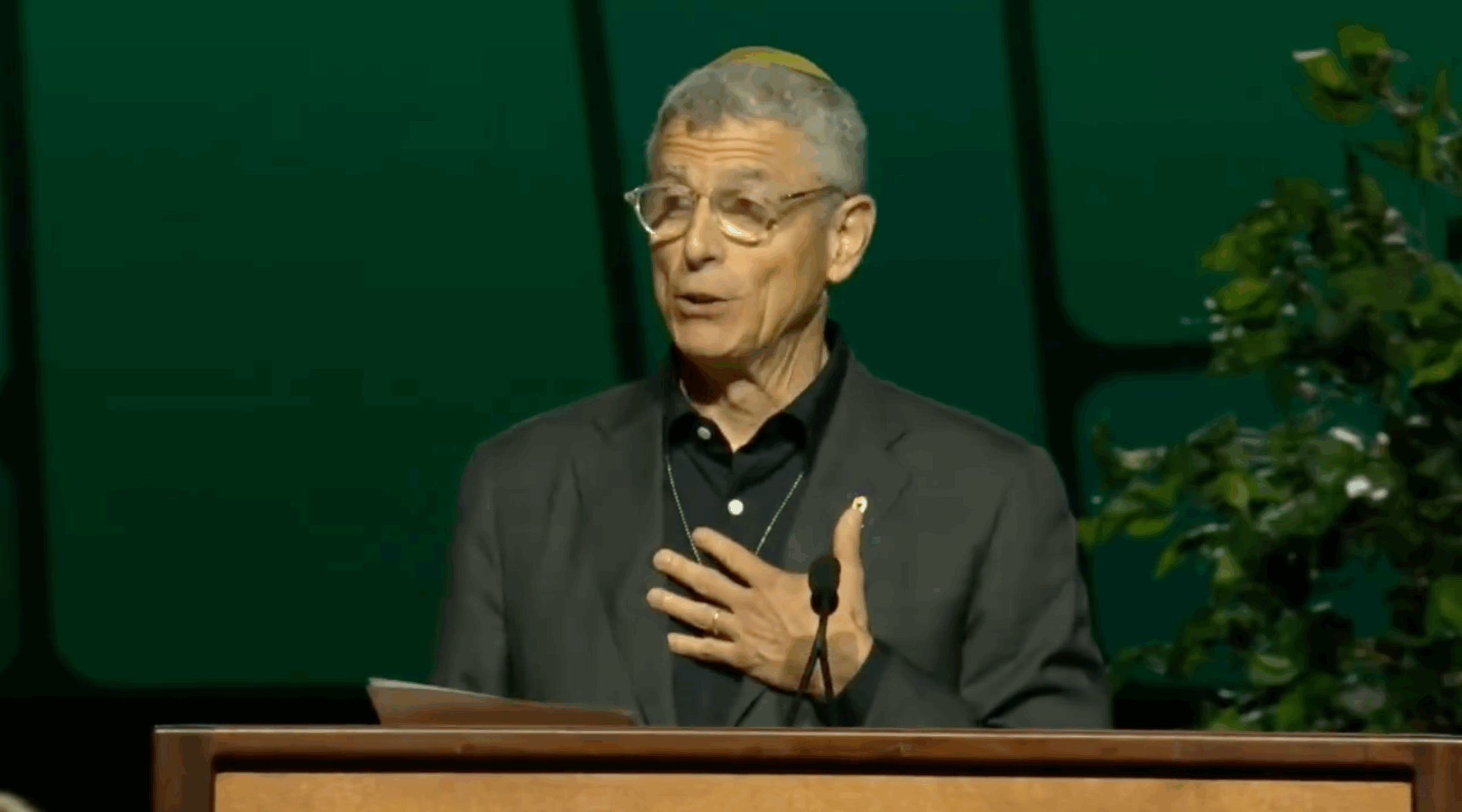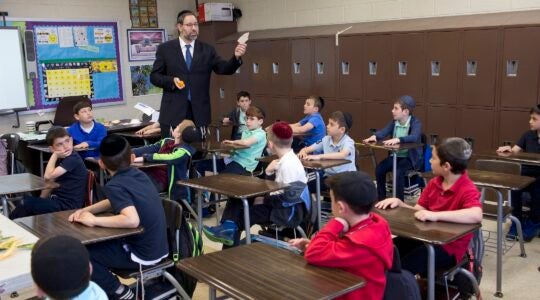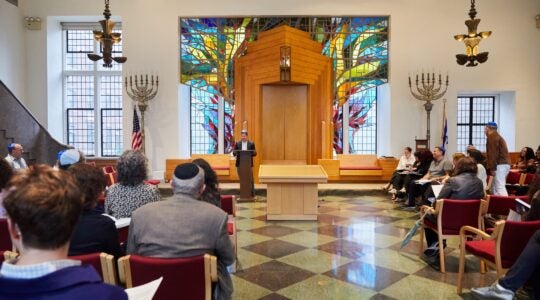Rabbi Rick Jacobs, the president of the Union for Reform Judaism, arrived at the Evangelical Lutheran Church in America Churchwide Assembly last week with decades of experience building ties between the Lutheran and Jewish communities.
But on Wednesday, as Jacobs listened to attendees debate a memorial titled “Stand of Palestinian Rights and End to Occupation of Palestine,” Jacobs said he felt compelled to speak out over what he saw as a “one-sided” narrative.
He tore up the speech he planned to give the next day, instead telling the hundreds of Christians gathered in Phoenix that he had hoped for something different — and that the stakes were high.
“Friends, I fear that the resolution you affirmed last night will make our community less safe,” Jacobs told the assembly. “I feel it will embolden those who do not envision a peaceful future for Palestinians and Israelis.”
Jacobs said in an interview that he had been startled by how little the statement seemed to acknowledge calls for peace that have come from Jewish communities, including the Reform movement. In May, Jacobs was one of the first denominational Jewish leaders to urge Israel to abandon what he said was a policy of “starving Gazan civilians” in an op-ed for the Washington Post — previewing the collective outcry over the humanitarian crisis in Gaza that has galvanized sharp criticism of Israel in recent weeks.
“We have the largest movement in Jewish life, and we love Israel, and we work closely with the church, and we also care about the rights and dignity of Palestinians,” Jacobs said. “I felt like they just didn’t in any way acknowledge all of those things that are also true, and it made me sad, to be honest.”
Memorial D4, which the assembly passed, outlined a list of stances for the Lutheran Church, including that the office of the presiding bishop “petition U.S. leaders to recognize and act to end the genocide against Palestinians, halt military aid to Israel used in Gaza, and support Palestinian statehood and U.N. membership.”
Jacobs said he was startled by how little the perspectives of Israelis and Jews were reflected in the statement. He brought his concerns to the church’s presiding bishop, Rev. Elizabeth Eaton, who invited him to formulate a response.
“There are some specific references to Israel in D4 but I felt like the empathy was entirely to the Palestinian narrative, which on one level I can understand,” said Jacobs. “But there really is a deep relationship of the church and Jewish communities locally, and I felt it from the senior leadership of the church, especially Bishop Eaton.”
The war in Gaza has caused some longstanding interfaith alliances to fray, as progressive churches and clergy were in some cases quick to condemn Israel’s response to Hamas’ Oct. 7, 2023, attack and sharply judgmental of those who did not share their perspective.
But Eaton, Jacobs said, was receptive to his concerns, telling him to “take the time you need” to think about how to broach them.
That night, he revised his speech, and on Thursday, he took his qualms to the lectern — rebuking the assembled crowd.
“It is possible to strongly support the State of Israel and at the very same time to fight for the dignity and rights of Palestinians,” he said in his remarks. “Last night, I was hoping to hear more of that kind of ‘both and’ thinking, but I didn’t.”
Jacobs then cited the violent attacks on Jewish gatherings in recent months, including the deadly shooting of two Israeli embassy staffers at an event in Washington, D.C. and the deadly firebombing attack on a group of demonstrators drawing attention to the remaining hostages in Gaza in Boulder, Colorado.
He also recounted several moments of unity between him and the Lutheran community, including one instance during the second intifada, a Palestinian uprising from 2000 to 2005 that was marked by a series of suicide bombings, in which Rev. Munib Younan, the bishop emeritus of the Evangelical Lutheran Church of Jordan and the Holy Land, drove Jacobs home for his safety.
And he emphasized that he and many liberal Jews share some if not all of the beliefs underlying the approved statement.
“We share your commitment to a free Palestine, free of tyranny and exploitation by Hamas and free of Israel’s occupation,” he said. He also spoke about the murder of Vivian Silver, the founder and leader of Women Wage Peace, an Israeli organization that supports a peace agreement with Palestinians, on Oct. 7.
“The brutal massacre on Oct. 7 included extraordinary people like Vivian,” said Jacobs. “It was as if Hamas was trying to murder not only people, but also the possibility for coexistence, and we, dear church, we must not allow them to kill the hope for a better tomorrow.”
In the conclusion of his address, Jacobs urged the Lutheran community to continue “working together” with the Jewish community, emphasizing a shared commitment to “bringing peace everywhere, everywhere and especially in the Middle East.”
“Challenges facing our faith communities and our nation can feel overwhelming, but facing them together gives us the possibility of transforming for good the tide of hate, demonization and anti-democratic attacks that threaten our freedom, our lives and our future,” he said in the speech. “But working together, oh yes, working together, we can and we will overcome.”
At the end of his remarks, Jacobs was met by a standing ovation, which he said left him feeling “very embraced and supported.”
Jacobs told JTA that he felt his strategy of confronting the assembly over his concerns in real-time was “successful,” and he hoped that “what I planted were seeds of deeper relationship.” He said he didn’t necessarily see his audience as just the Lutherans in the room.
“I’m not naive. I don’t think one talk and one gathering changes everything, or maybe changes most things,” he said. “But I want it to be appreciated, and I want my clergy colleagues, particularly my Jewish leader colleagues, to realize that you don’t have to agree with a community on every point to work with them and to find ways to be in community with them.”
JTA has documented Jewish history in real-time for over a century. Keep our journalism strong by joining us in supporting independent, award-winning reporting.






